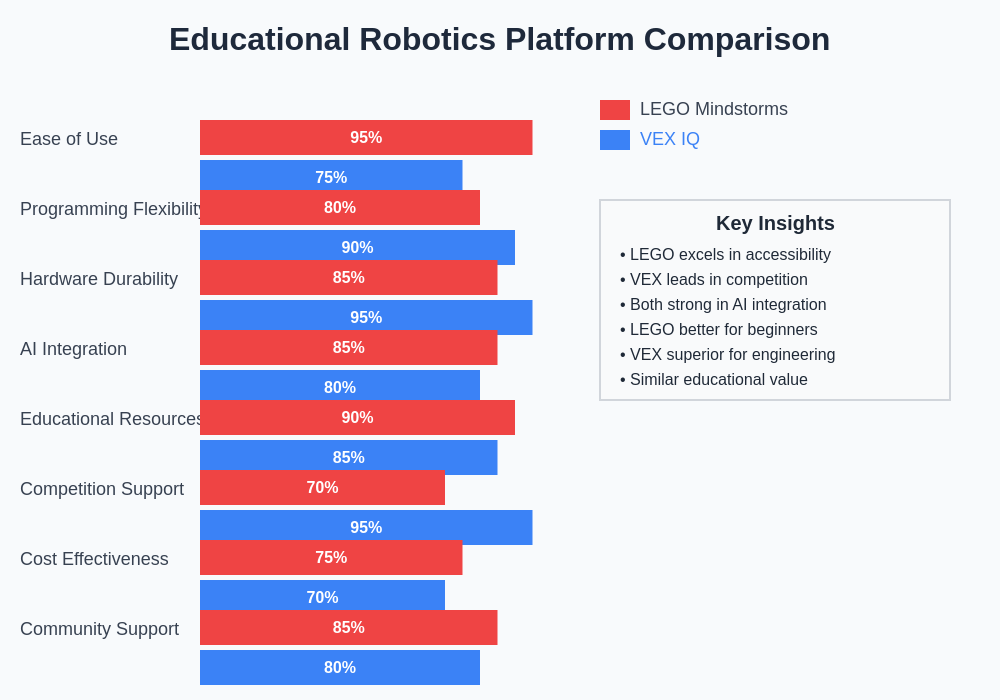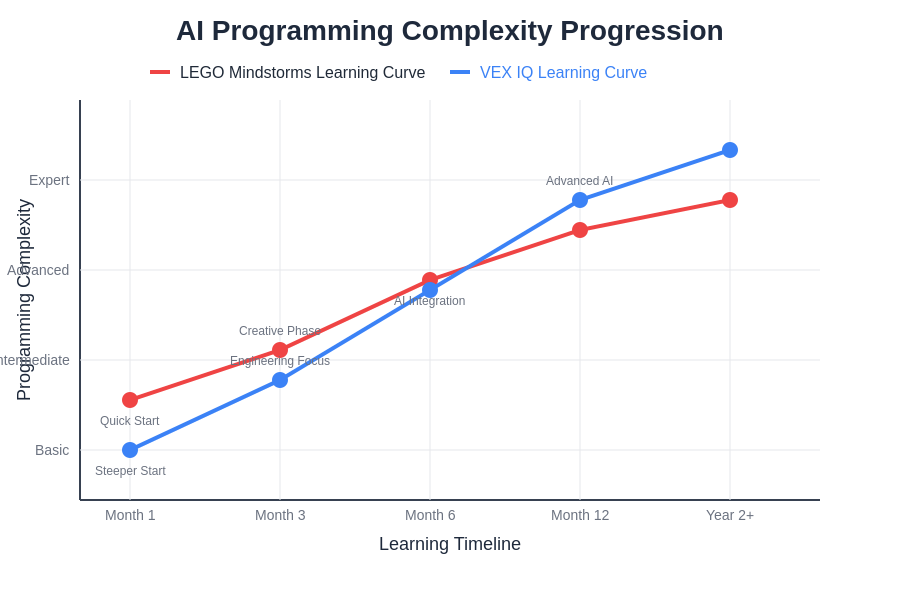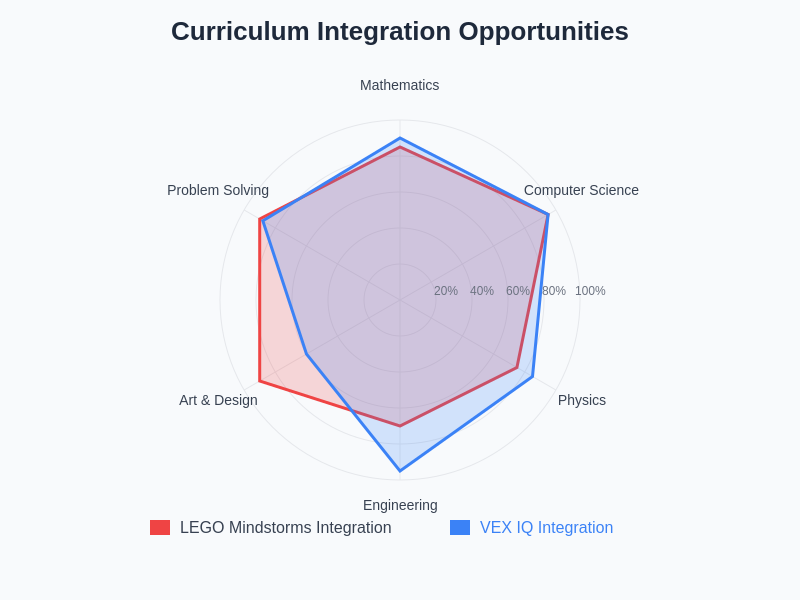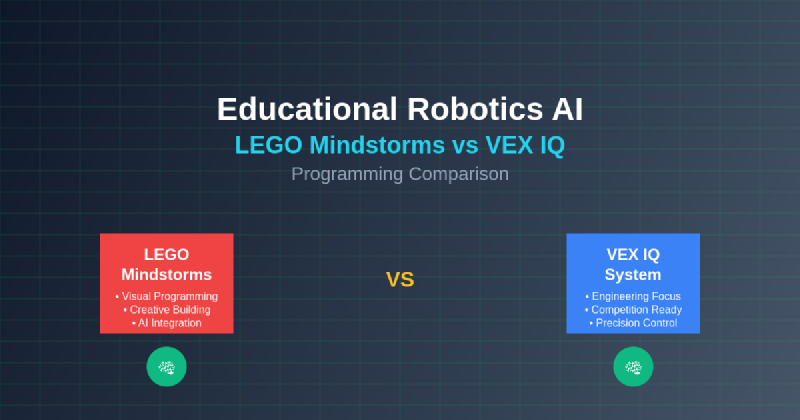The intersection of artificial intelligence and educational robotics represents one of the most exciting frontiers in modern STEM education, offering students unprecedented opportunities to engage with complex technological concepts through hands-on experimentation and creative problem-solving. Two platforms have emerged as dominant forces in this educational landscape: LEGO Mindstorms and VEX IQ, each bringing unique strengths and distinctive approaches to AI-driven robotics programming that cater to different learning styles, educational objectives, and institutional requirements.
Explore the latest AI educational trends to discover how cutting-edge technologies are transforming learning experiences and preparing students for an AI-driven future. The evolution of educational robotics platforms has fundamentally transformed how students interact with artificial intelligence concepts, moving beyond theoretical understanding to practical implementation and real-world application of AI principles in tangible, engaging formats.
Understanding Educational Robotics AI Platforms
Educational robotics platforms serve as comprehensive learning ecosystems that combine hardware construction, software programming, and artificial intelligence concepts into cohesive educational experiences designed to develop critical thinking, problem-solving, and technical skills. These platforms have evolved significantly from simple programmable toys to sophisticated educational tools capable of introducing students to advanced AI concepts including machine learning, computer vision, natural language processing, and autonomous decision-making systems.
The integration of AI capabilities into educational robotics platforms has created new opportunities for students to explore complex algorithms, understand sensor-based decision making, and experiment with autonomous behaviors that mirror real-world robotic applications. This evolution has transformed robotics education from basic programming exercises to comprehensive explorations of artificial intelligence principles, preparing students for careers in emerging technology fields while fostering creativity and innovation through hands-on experimentation.
LEGO Mindstorms and VEX IQ represent two distinct philosophies in educational robotics design, each offering unique advantages and targeting different aspects of the learning experience. Understanding these differences is crucial for educators, parents, and institutions seeking to implement effective robotics programs that align with specific educational goals and student demographics.
LEGO Mindstorms: Creative Construction Meets AI Programming
LEGO Mindstorms has established itself as a pioneering force in educational robotics by leveraging the familiar LEGO building system to create an accessible entry point into advanced programming and AI concepts. The platform’s strength lies in its intuitive construction methodology, allowing students to rapidly prototype and iterate on robotic designs while simultaneously exploring sophisticated programming concepts through visual, block-based interfaces that gradually introduce more complex AI-driven behaviors.
The Mindstorms ecosystem encompasses multiple generations of hardware and software evolution, with each iteration incorporating increasingly sophisticated AI capabilities while maintaining the platform’s core commitment to accessibility and creative expression. The current EV3 and Robot Inventor systems provide comprehensive sensor suites, powerful processing capabilities, and extensive programming environments that support everything from basic autonomous behaviors to advanced machine learning implementations.
Experience advanced AI programming with Claude to understand how modern AI systems can enhance educational robotics programming and provide intelligent assistance for complex problem-solving scenarios. The integration of AI-powered development tools with educational robotics platforms creates new opportunities for students to explore cutting-edge programming techniques while receiving intelligent guidance and support throughout their learning journey.
The LEGO Mindstorms programming environment has evolved to include sophisticated AI-driven features including computer vision capabilities, machine learning algorithms, and cloud-based processing that enables students to experiment with advanced AI concepts while maintaining the platform’s characteristic ease of use. These capabilities allow students to create robots that can recognize objects, learn from experience, adapt to changing environments, and make autonomous decisions based on complex sensor data analysis.
VEX IQ: Engineering Precision in AI Education
VEX IQ approaches educational robotics from an engineering-focused perspective, emphasizing precision construction, competitive programming, and systematic problem-solving methodologies that prepare students for advanced robotics and AI applications. The platform’s metal-based construction system provides superior structural integrity and mechanical precision compared to plastic alternatives, enabling the creation of more sophisticated mechanisms and allowing for deeper exploration of mechanical engineering principles alongside AI programming concepts.
The VEX IQ programming environment offers multiple pathways for AI exploration, ranging from visual block-based programming suitable for beginners to text-based programming languages that support advanced AI algorithm implementation. This progression enables students to gradually develop expertise while maintaining engagement through increasingly sophisticated challenges that mirror real-world robotics applications and artificial intelligence implementations.
The platform’s emphasis on competitive robotics through programs like VEX IQ Challenge creates opportunities for students to apply AI concepts in dynamic, real-world scenarios where autonomous decision-making, strategic planning, and adaptive behaviors determine success. This competitive element adds urgency and relevance to AI programming education while fostering collaboration, critical thinking, and iterative improvement through systematic testing and refinement.
VEX IQ’s sensor ecosystem provides comprehensive data collection capabilities that enable sophisticated AI implementations including environmental mapping, object recognition, predictive modeling, and autonomous navigation. The platform’s processing power and memory capacity support complex algorithms while maintaining real-time responsiveness necessary for competitive robotics applications and advanced AI experimentation.
Programming Environments and AI Integration
The programming environments provided by both platforms have evolved to incorporate increasingly sophisticated AI capabilities while maintaining accessibility for students across different skill levels. LEGO Mindstorms utilizes visual programming interfaces that abstract complex AI concepts into intuitive drag-and-drop interactions, enabling students to implement machine learning algorithms, computer vision systems, and autonomous decision-making processes without requiring extensive programming background or mathematical prerequisites.
VEX IQ offers both visual and text-based programming options, providing flexibility for different learning styles and educational objectives while supporting advanced AI algorithm implementation through comprehensive libraries and development tools. The platform’s programming environment includes built-in AI tutorials, sample projects, and comprehensive documentation that guides students through progressively complex AI implementations while maintaining focus on practical applications and real-world problem-solving.
Enhance your research capabilities with Perplexity AI to explore the latest developments in educational robotics and artificial intelligence programming techniques. The rapid evolution of AI technologies requires continuous learning and adaptation, making access to comprehensive research tools essential for educators and students seeking to stay current with emerging trends and best practices.
Both platforms provide cloud-based development environments that enable collaborative programming, remote learning, and access to advanced AI processing capabilities that exceed the limitations of local hardware. These cloud integrations allow students to experiment with resource-intensive AI algorithms, access comprehensive datasets for machine learning projects, and collaborate on complex projects that require distributed development and testing.
Hardware Capabilities and AI Processing
The hardware foundations of both platforms have been specifically designed to support AI applications while maintaining educational accessibility and cost-effectiveness. LEGO Mindstorms EV3 and Robot Inventor systems include powerful ARM processors, substantial memory capacity, and comprehensive sensor suites that enable real-time AI processing, complex algorithm execution, and sophisticated autonomous behaviors that demonstrate practical AI applications in tangible, engaging formats.
VEX IQ hardware emphasizes precision and reliability, featuring robust construction materials, high-precision sensors, and processing capabilities optimized for competitive robotics applications where consistent performance and rapid response times are critical for success. The platform’s modular design enables extensive customization and expansion, supporting complex AI implementations that require specialized sensors, actuators, and processing capabilities.
The sensor ecosystems of both platforms provide comprehensive data collection capabilities essential for AI applications including ultrasonic distance measurement, color and light detection, gyroscopic orientation sensing, and touch interaction recognition. These sensors enable students to implement sophisticated AI algorithms including environmental mapping, object recognition and classification, adaptive navigation, and predictive modeling based on real-world sensor data collection and analysis.
Both platforms support expansion through third-party sensors and accessories that extend AI capabilities including camera systems for computer vision applications, wireless communication modules for distributed AI systems, and specialized sensors for specific application domains. This extensibility ensures that educational programs can evolve and adapt to incorporate emerging AI technologies and application areas.
Learning Progression and Skill Development
Educational robotics platforms must provide clear progression pathways that guide students from basic concepts to advanced AI implementations while maintaining engagement and preventing frustration through appropriate challenge escalation. LEGO Mindstorms excels in providing intuitive entry points that allow students to achieve early success while gradually introducing more complex concepts through scaffolded learning experiences that build upon previous knowledge and skills.
The LEGO approach emphasizes creative expression and exploratory learning, encouraging students to experiment with different solutions and learn through iterative design processes that mirror real-world AI development methodologies. This approach develops crucial skills including problem decomposition, algorithmic thinking, systematic debugging, and creative problem-solving that are essential for success in AI-related fields.
VEX IQ provides structured learning pathways that emphasize systematic skill development, engineering principles, and competitive application of knowledge through organized challenges and competitions. This approach develops disciplined thinking, systematic problem-solving, and performance optimization skills that prepare students for advanced robotics and AI applications in professional contexts.
Both platforms provide comprehensive educational resources including curriculum guides, project libraries, video tutorials, and teacher training programs that ensure effective implementation in educational settings. These resources enable educators to effectively utilize platform capabilities while adapting content to specific educational objectives, student populations, and institutional requirements.

The comparative analysis of educational robotics platforms reveals distinct strengths and optimal use cases for each system. LEGO Mindstorms demonstrates superior accessibility and creative flexibility, while VEX IQ excels in engineering precision and competitive applications, creating complementary approaches to AI education. The comprehensive evaluation across multiple dimensions shows how each platform serves different educational priorities and learning objectives.
AI Algorithm Implementation and Complexity
The implementation of artificial intelligence algorithms within educational robotics platforms requires careful balance between educational accessibility and technical sophistication to ensure that students can engage meaningfully with AI concepts while developing practical skills applicable to real-world scenarios. LEGO Mindstorms approaches this challenge through visual programming interfaces that abstract complex mathematical operations into intuitive graphical representations, enabling students to implement machine learning algorithms, neural networks, and optimization techniques without requiring extensive mathematical background.
The platform’s AI implementations include pre-built algorithm libraries for common applications including pathfinding, pattern recognition, adaptive control systems, and basic machine learning that students can customize and extend for specific applications. These implementations provide excellent starting points for exploration while enabling advanced students to dive deeper into algorithm internals and develop custom solutions for unique challenges.
VEX IQ supports more direct algorithm implementation through text-based programming environments that provide access to comprehensive AI libraries, mathematical functions, and optimization tools necessary for advanced AI development. This approach enables students to work directly with algorithm implementations, understand underlying mathematical principles, and develop custom AI solutions that demonstrate sophisticated understanding of artificial intelligence concepts and applications.
The platform’s support for competitive robotics creates natural applications for AI algorithms including strategic planning, real-time adaptation, opponent modeling, and performance optimization that demonstrate practical AI applications in dynamic, unpredictable environments where traditional programming approaches prove insufficient.
Real-World Applications and Project Examples
Educational robotics platforms achieve maximum impact when students can connect their learning experiences to real-world applications and understand how their skills translate to professional contexts and societal challenges. LEGO Mindstorms projects often focus on creative problem-solving and exploration, enabling students to develop robots that address environmental challenges, assist individuals with disabilities, automate household tasks, or create artistic expressions through technology integration.
Notable LEGO Mindstorms AI projects include autonomous vehicles that navigate complex environments using computer vision and machine learning, home automation systems that learn user preferences and adapt behaviors accordingly, and assistive technologies that help individuals with mobility or communication challenges. These projects demonstrate how AI concepts translate to meaningful applications while maintaining accessibility for students across different skill levels and interests.
VEX IQ applications emphasize engineering solutions and competitive challenges that mirror real-world robotics applications in manufacturing, logistics, exploration, and service industries. Students develop robots that can perform complex manipulation tasks, navigate challenging environments, coordinate with team members, and adapt to changing conditions through intelligent decision-making and strategic planning.
Competitive VEX IQ challenges require sophisticated AI implementations including multi-robot coordination, strategic planning under time constraints, adaptive behaviors that respond to opponent actions, and optimization algorithms that maximize performance under specific scoring criteria. These challenges provide excellent preparation for careers in robotics, artificial intelligence, and engineering fields where similar problems and constraints define professional success.

The progression of AI programming complexity demonstrates how educational robotics platforms scaffold learning experiences from basic autonomous behaviors to sophisticated artificial intelligence implementations. This gradual increase in complexity ensures student engagement while developing advanced technical skills. The learning curves show distinct patterns for each platform, with LEGO Mindstorms providing gentler initial progression and VEX IQ offering accelerated advancement for dedicated learners.
Cost Considerations and Educational Value
Educational institutions must carefully evaluate the cost-effectiveness of robotics platforms while considering long-term educational outcomes, maintenance requirements, and scalability for program expansion. LEGO Mindstorms systems represent significant initial investments but provide excellent durability, extensive reusability, and comprehensive educational resources that maximize value over extended deployment periods.
The modular nature of LEGO construction enables extensive reuse of components across different projects and academic years, reducing long-term costs while maintaining high levels of student engagement through varied project experiences. The platform’s software updates and educational resource expansions provide ongoing value enhancement without requiring additional hardware investments, ensuring that programs remain current with emerging AI technologies and educational best practices.
VEX IQ systems require higher initial investments but provide superior durability and precision that support intensive use in competitive environments and advanced engineering applications. The platform’s metal construction and precision components ensure reliable performance over extended periods while supporting more sophisticated mechanical implementations that enable advanced AI applications.
The competitive ecosystem surrounding VEX IQ creates additional value through organized events, networking opportunities, and scholarship programs that provide tangible benefits for student participants while connecting educational programs to broader robotics and AI communities. These connections often translate to career opportunities, mentorship relationships, and continued engagement with robotics and AI fields beyond formal educational experiences.
Teacher Training and Support Infrastructure
Successful implementation of educational robotics platforms requires comprehensive teacher training and ongoing support infrastructure that ensures educators can effectively utilize platform capabilities while adapting content to specific educational contexts and student needs. LEGO Mindstorms provides extensive professional development opportunities including workshops, online training modules, certification programs, and peer networking that help educators develop confidence and expertise in robotics and AI education.
The platform’s educational resources include detailed curriculum guides, assessment rubrics, project templates, and differentiation strategies that enable effective implementation across diverse student populations and educational settings. These resources reduce preparation time while ensuring consistent educational outcomes and providing flexibility for customization based on specific institutional requirements and learning objectives.
VEX IQ offers comprehensive teacher training through regional workshops, online professional development, and mentorship programs that connect educators with experienced practitioners and robotics professionals. The platform’s competitive focus creates additional support through coaching resources, strategic guides, and community forums where educators share best practices and collaborative solutions to common challenges.
Both platforms maintain active user communities that provide ongoing support, resource sharing, and collaborative problem-solving opportunities for educators implementing robotics programs. These communities serve as valuable resources for troubleshooting technical issues, sharing successful project ideas, and staying current with platform updates and emerging educational best practices.
Assessment and Learning Outcomes Measurement
Effective educational robotics programs require robust assessment strategies that measure both technical skill development and broader learning outcomes including critical thinking, collaboration, creativity, and problem-solving capabilities. LEGO Mindstorms supports diverse assessment approaches through portfolio-based evaluation, peer assessment, and performance-based demonstrations that capture the full range of student learning experiences and skill development.
The platform’s emphasis on creative expression and exploratory learning creates opportunities for authentic assessment through project presentations, design journals, and reflection activities that demonstrate student understanding of AI concepts while showcasing individual creativity and problem-solving approaches. These assessment strategies provide comprehensive evaluation of student progress while maintaining engagement through varied evaluation formats.
VEX IQ’s competitive focus enables performance-based assessment through objective metrics, systematic improvement tracking, and comparative analysis that provides clear indicators of skill development and mastery. The platform’s emphasis on precision and optimization creates natural assessment opportunities through quantitative performance measurement and systematic analysis of design decisions and implementation strategies.
Both platforms support formative assessment through iterative design processes, peer collaboration, and reflective analysis that help students understand their learning progress while developing metacognitive skills essential for lifelong learning in rapidly evolving technology fields. These assessment approaches provide valuable feedback for both students and educators while supporting continuous program improvement and adaptation.
Future Trends and Technology Integration
The evolution of educational robotics platforms continues to accelerate through integration of emerging technologies including cloud computing, machine learning, computer vision, and internet-of-things connectivity that expand educational possibilities while maintaining accessibility for diverse student populations. LEGO Mindstorms continues to integrate cutting-edge AI capabilities through software updates and cloud-based services that provide access to advanced processing capabilities and comprehensive datasets for machine learning projects.
The platform’s commitment to accessibility ensures that emerging AI technologies remain approachable for students while providing pathways for advanced exploration and customization. Future developments are likely to include enhanced computer vision capabilities, natural language processing integration, and collaborative AI systems that enable more sophisticated educational experiences while maintaining the platform’s characteristic ease of use.
VEX IQ’s future development focuses on enhanced precision, expanded competitive opportunities, and integration with professional robotics tools and methodologies that provide seamless transitions from educational contexts to career applications. The platform’s emphasis on engineering excellence ensures that emerging technologies are integrated in ways that enhance educational value while maintaining reliability and performance standards essential for competitive applications.
Both platforms are likely to benefit from continued AI advancement through improved development tools, enhanced simulation capabilities, and expanded cloud-based services that provide access to cutting-edge AI technologies without requiring expensive local hardware upgrades. These developments will continue to democratize access to advanced AI education while providing pathways for students to engage with the latest technological innovations.

The integration potential across academic disciplines demonstrates how educational robotics platforms can enhance learning outcomes beyond traditional STEM subjects. Both LEGO Mindstorms and VEX IQ offer unique strengths in different curricular areas, with LEGO excelling in creative and design-oriented subjects while VEX provides superior integration opportunities in engineering and physics applications.
Conclusion and Recommendations
The choice between LEGO Mindstorms and VEX IQ depends heavily on specific educational objectives, student populations, institutional resources, and long-term program goals, with both platforms offering distinct advantages that serve different aspects of AI education effectively. LEGO Mindstorms excels in creative exploration, accessibility, and broad skill development that serves diverse student interests while providing strong foundations in AI concepts and programming principles.
VEX IQ provides superior engineering precision, competitive applications, and systematic skill development that prepare students for advanced robotics careers while demonstrating practical applications of AI in challenging, real-world scenarios. The platform’s emphasis on performance optimization and systematic problem-solving develops valuable skills for students pursuing technical careers in robotics and artificial intelligence fields.
Educational institutions benefit from understanding these distinctions when making platform selection decisions, with many successful programs incorporating elements from both platforms to provide comprehensive robotics education that serves diverse student interests and career pathways. The combination of creative exploration and engineering precision creates robust educational experiences that prepare students for success in an increasingly AI-driven technological landscape.
The future of educational robotics lies in continued integration of emerging AI technologies with accessible, engaging educational experiences that inspire student interest while developing practical skills applicable to real-world challenges and career opportunities. Both LEGO Mindstorms and VEX IQ contribute valuable components to this educational ecosystem, supporting the development of the next generation of robotics and AI professionals through innovative, hands-on learning experiences.
Disclaimer
This article is for educational and informational purposes only and does not constitute professional advice regarding educational technology selection or implementation. The views expressed are based on current understanding of educational robotics platforms and their applications in AI education. Readers should conduct their own research and consider their specific educational requirements, budget constraints, and student populations when selecting robotics platforms. The effectiveness of educational robotics programs depends on various factors including teacher training, institutional support, and alignment with broader educational objectives. Platform capabilities and features may vary based on specific product versions and software updates.
